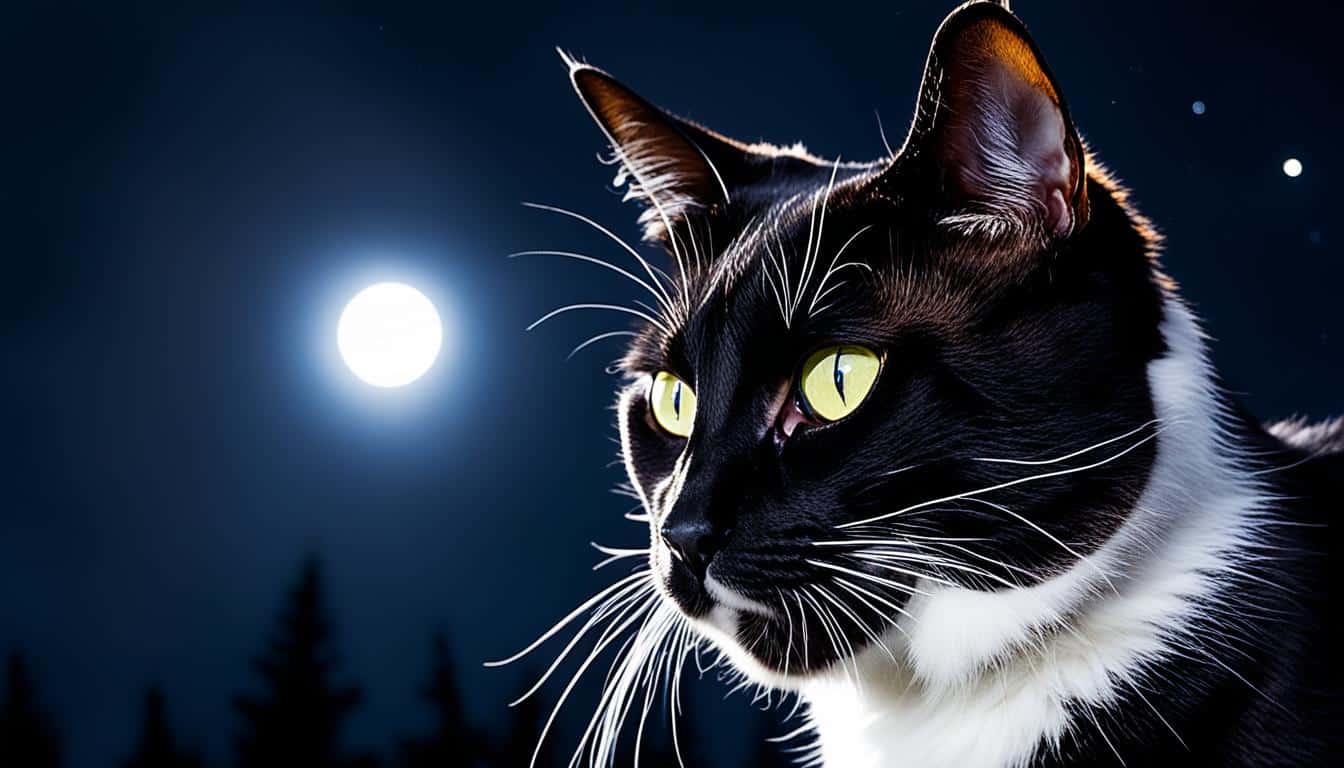Why Is My Cat Meowing At Night? Understanding The Reasons And Strategies To Stop It
Is your cat keeping you up at night with its incessant meowing? If so, you’re not alone. Many Cat Meowing At Night owners struggle to understand why their beloved feline companions suddenly become vocal when the sun goes down. In this article, we will explore the reasons behind this behavior and provide effective strategies to help you put an end to your cat’s nighttime meowing.
Key Takeaways
- Understanding the reasons behind your cat’s nighttime meowing is crucial for finding a solution.
- Common causes of cat meowing at night include senior cats, cats that are active during the nighttime, and cats with separation anxiety.
- Underlying medical conditions, such as overactive thyroid or pain, can trigger nighttime meowing in cats.
- Behavioral issues and environmental factors, such as disorientation or the need for neutering, can contribute to a cat’s nocturnal vocalization.
- Ensuring your cat’s basic needs are met, such as food, water, and attention, can help reduce nighttime meowing.
Common Reasons for Cat Meowing at Night
There are several common reasons why your cat may start meowing during the night. Understanding these reasons can help you address your cat’s nighttime vocalization and find effective solutions. Let’s explore these reasons in more detail:
1. Senior Cat
As cats age, they may experience changes in their sleep patterns and become more active at night. Senior cats may meow to communicate their discomfort, seek attention, or express confusion. It’s important to provide them with a comfortable and secure sleeping environment to reduce nighttime meowing.
2. Cats That Are Active at Night
Many cats, especially those with nocturnal instincts, are naturally more active during the night. These cats may engage in play, exploration, or hunting behaviors that can lead to increased meowing. Providing interactive toys, engaging them in play sessions before bedtime, and creating a stimulating environment during the day can help channel their energy and reduce nighttime vocalization.
3. Cats with Medical Conditions
Certain medical conditions can cause cats to meow at night. For example, cats with hyperthyroidism or other underlying pain may vocalize as a way to communicate their discomfort. If you suspect that your cat’s nighttime meowing is due to a medical issue, it is important to consult with your veterinarian for a proper diagnosis and treatment.
4. Separation Anxiety in Cats
Separation anxiety can also contribute to cats meowing at night. Cats who are used to constant companionship may become stressed or anxious when left alone, leading to increased vocalization. Establishing a consistent routine, providing comforting items like blankets or clothing with your scent, and considering behavioral modification techniques can help alleviate separation anxiety in cats.
Understanding these common reasons why your cat may meow at night is the first step towards finding a solution. By addressing the underlying cause and implementing appropriate strategies, you can help your cat have a more restful night’s sleep while ensuring your own peace of mind.
Medical Conditions that Trigger Nighttime Meowing
Sometimes, cats meow at night due to underlying medical conditions. It’s important to recognize these common reasons and their connection to nighttime vocalization. Two medical conditions that can cause cats to meow at night are:
- Overactive Thyroid: Also known as hyperthyroidism, this condition occurs when the thyroid gland produces an excessive amount of thyroid hormone. Cats with an overactive thyroid may exhibit increased appetite, weight loss, restlessness, and excessive meowing, especially during nighttime.
- Other Medical Conditions: Pain or discomfort from various medical conditions can also trigger nighttime meowing. Cats may meow at night if they are experiencing dental issues, arthritis, urinary tract infections, or gastrointestinal problems.
It is essential to consult with a veterinarian if you suspect your cat’s nighttime meowing may be linked to a medical condition. A thorough examination and appropriate diagnostic tests can help identify and address any underlying health concerns.
“When cats meow at night consistently, it’s crucial to consider the possibility of an underlying medical condition. Seeking veterinary assistance is essential to ensure your cat’s well-being.”
To provide a visual representation of these medical conditions, below is a table summarizing the common reasons for cats meowing at night and their related medical conditions:
| Common Reasons | Related Medical Conditions |
|---|---|
| Overactive Thyroid | Hyperthyroidism |
| Pain or Discomfort | Dental Issues, Arthritis, Urinary Tract Infections, Gastrointestinal Problems |
Addressing these medical conditions and providing appropriate treatment can help alleviate your cat’s nighttime meowing and improve their overall well-being.

Behavioral Issues and Environmental Factors
When it comes to understanding why your cat meows at night, there are various behavioral issues and environmental factors that can play a role. Cats, especially those that are active at dusk and dawn, may be more likely to exhibit nighttime vocalization. Let’s explore some of the common reasons behind these behaviors and how you can address them.
Disorientation
Cats are known for their keen sense of direction and orientation. However, certain factors can lead to disorientation, causing them to meow at night. For example, if you’ve recently moved or rearranged furniture in your home, your cat may struggle to navigate their surroundings, leading to confusion and vocalization. Providing a secure and consistent environment can help reduce disorientation and minimize nighttime meowing.
Importance of Neutering
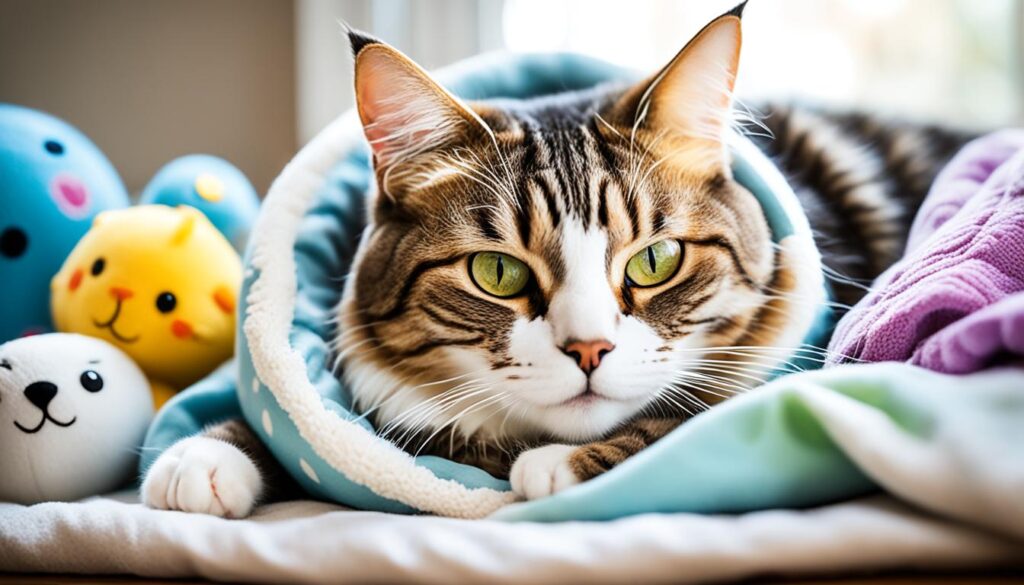
One of the essential steps in managing your cat’s nighttime vocalization is ensuring they are neutered. Unneutered cats, especially males, are more prone to vocalization and restless behavior. By neutering your cat, you can help reduce their urge to roam, fight, and vocalize during the night. Consult with your veterinarian about the appropriate age and timing for neutering to promote a calmer and quieter nighttime routine for your furry friend.
6 Reasons
Here are six reasons why addressing behavioral issues and environmental factors is crucial:
- Minimizing disturbance: By identifying and resolving behavioral issues, you can create a peaceful environment for you and your cat during the night.
- Quality sleep: A calm nighttime routine can ensure your cat experiences uninterrupted and restful sleep, promoting their overall well-being.
- Reducing stress: Disorientation or other environmental factors can cause stress in cats, leading to increased nighttime vocalization. Addressing these issues can help alleviate their anxiety and promote a sense of security.
- Improved human sleep: Excessive meowing can disrupt your sleep patterns and impact your daily life. By addressing behavioral issues, you can create a harmonious sleep environment for both you and your cat.
- Preventing territorial conflicts: Neutering your cat reduces their desire to mark their territory, reducing the likelihood of overnight fights or disagreements with other cats in the area.
- Enhancing the bond: By understanding and addressing your cat’s behavioral needs, you can strengthen your bond and create a more fulfilling relationship based on trust and understanding.
By unraveling the behavioral and environmental factors contributing to your cat’s nighttime meowing, you can take proactive steps to create a peaceful and harmonious environment for both you and your feline companion.
Hunger, Thirst, and Basic Needs
Sometimes, a cat may meow at night due to their basic needs not being met. Hunger, thirst, or a desire for attention can all contribute to nighttime vocalization. It’s important to address these needs to help reduce excessive meowing during the night.
Food and Water: Ensuring that your cat has access to fresh food and water throughout the day can help prevent hunger and thirst-related meowing. Cats typically have small stomachs and need to eat multiple small meals. Consider providing a feeding schedule that aligns with their natural feeding patterns.
Boredom: Younger cats, in particular, can become bored during the night, leading to increased vocalization. Providing interactive toys, scratching posts, and puzzle feeders can help keep them engaged and entertained. Interactive play sessions before bedtime can also help tire them out, promoting a more restful night’s sleep.
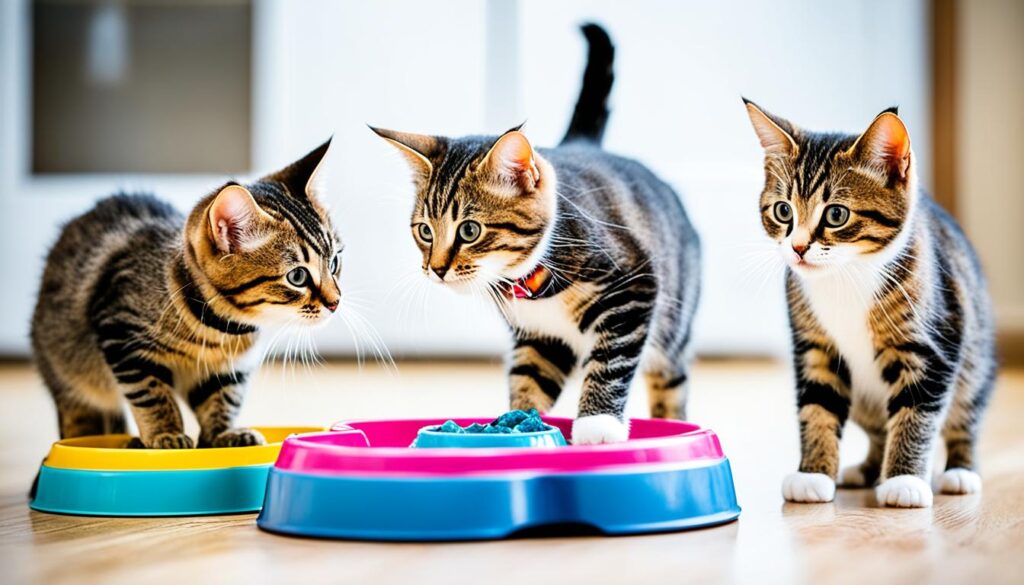
Attention and Interaction: Cats are social creatures and need attention from their human companions. Spending quality time with your cat during the day and engaging in play or grooming sessions can help satisfy their need for companionship. Try incorporating interactive activities into your cat’s daily routine to keep them mentally stimulated and less likely to meow for attention at night.
Boredom can often be a contributing factor to nighttime vocalization in cats. Providing mental stimulation and engaging playtime can help alleviate this boredom and reduce excessive meowing during the night.
Creating a Calm Environment
In addition to meeting their basic needs, creating a calm environment can also help reduce nighttime meowing. Here are a few tips:
- Provide a comfortable sleeping area for your cat away from distractions or noise.
- Consider using pheromone diffusers or calming sprays to create a peaceful atmosphere.
- Keep your cat’s litter box clean to avoid any discomfort or anxiety.
- Establish a consistent bedtime routine that includes a quiet, low-stimulus environment.
By addressing your cat’s hunger, thirst, and need for attention, as well as creating a calm sleeping environment, you can significantly reduce nighttime meowing and promote a more peaceful night’s sleep for both you and your feline companion.
Psychological and Emotional Factors
Cats can become vocal at night due to psychological and emotional factors. Anxiety and loneliness are two common reasons why cats may meow during nighttime hours. It’s important to understand how these factors can contribute to their nocturnal vocalization and address them appropriately.
Anxiety can manifest in cats due to various reasons such as changes in their environment, unfamiliar or stressful situations, or separation from their owners. When cats feel anxious, they may vocalize to express their discomfort and seek reassurance. Providing a secure and calm space for your cat, along with interactive toys and plenty of attention during the day, can help alleviate their nighttime anxiety.
Loneliness is another emotional factor that can lead to nighttime meowing in cats. Cats are social animals, and if they feel isolated or lack companionship, they may meow to attract attention or signal their desire for interaction. Spending quality time with your cat during the day, engaging them in play sessions, and providing opportunities for socialization can reduce their feelings of loneliness and decrease nighttime vocalization.
“Understanding the psychological and emotional needs of your cat is crucial in addressing their nighttime meowing. By creating a supportive and enriching environment, you can help your cat feel more secure and content, reducing their need for vocalization during the night.”
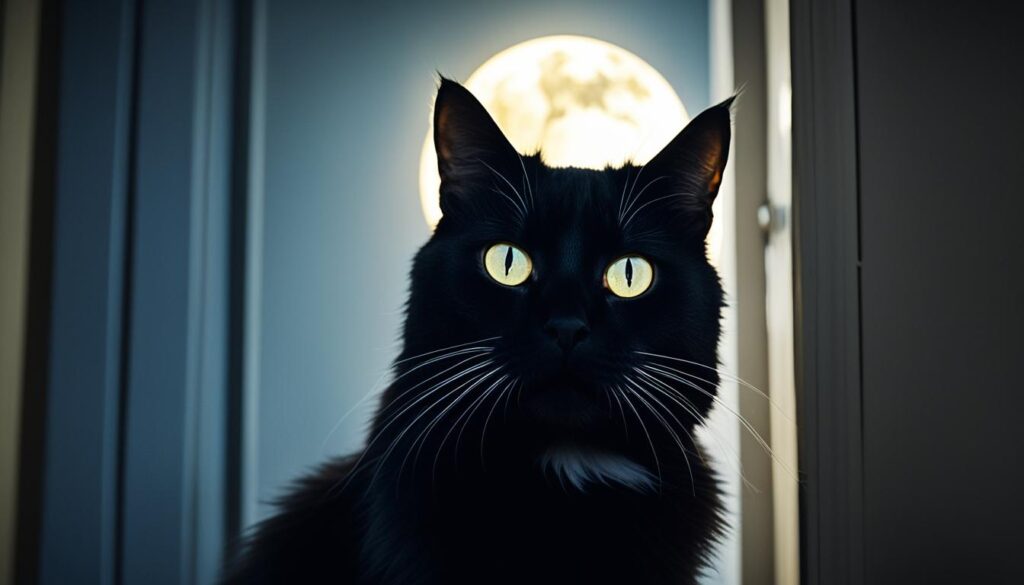
In some cases, cats may also develop medical conditions that contribute to their nighttime vocalization. It’s essential to rule out any underlying health issues that may be causing discomfort or distress to your cat. Common medical conditions that can trigger meowing at night include urinary tract infections, gastrointestinal problems, or age-related disorders.
If you suspect that your cat’s nighttime meowing is due to a medical condition, it’s recommended to consult with a veterinarian. They can perform a thorough examination, conduct diagnostic tests if necessary, and provide appropriate treatment to alleviate your cat’s symptoms.
Common Medical Conditions Contributing to Nighttime Meowing:
| Medical Condition | Symptoms |
|---|---|
| Urinary Tract Infection (UTI) | Increased frequency of urination, discomfort during urination, blood in urine |
| Gastrointestinal Problems | Vomiting, diarrhea, loss of appetite |
| Age-related Disorders | Arthritis, cognitive dysfunction, sensory decline |
By addressing any underlying medical conditions and providing a supportive environment to cater to your cat’s psychological and emotional needs, you can help reduce their nighttime meowing, ensuring a peaceful and restful night for both you and your feline companion.
Older Cats and Cognitive Changes
As cats age, they may undergo cognitive changes that can lead to increased meowing at night. These changes in behavior are often attributed to a combination of factors, including physical discomfort and mental decline.
One common physical discomfort that older cats may experience is arthritis, which can make it difficult for them to move around comfortably. This discomfort can cause restlessness and lead to increased vocalization, especially during the night when they may try to find a more comfortable position to sleep.
It’s important to provide older cats with the necessary support and accommodation to help them navigate their environment. Installing a cat flap can give them easier access to their favorite spots and eliminate the need for constant meowing to be let in or out. Additionally, providing soft bedding and elevated surfaces can help alleviate discomfort and allow them to rest more peacefully.
Aside from physical discomfort, older cats may also experience cognitive decline that can contribute to nighttime vocalization. This decline can manifest as confusion and disorientation, leading to increased meowing as the cat tries to communicate their distress.
Creating a consistent routine and environment can help ease cognitive changes in older cats and minimize their nighttime meowing. Providing familiar surroundings and avoiding drastic changes to their living space can help reduce confusion and frustration. Engaging them in mentally stimulating activities, such as puzzle toys or interactive play sessions, can also help keep their minds sharp and alleviate restlessness.
Remember, older cats require a little extra care and attention. By understanding the impact of cognitive changes on your aging feline companion and taking steps to support their well-being, you can help them lead a happier and quieter life during the night.
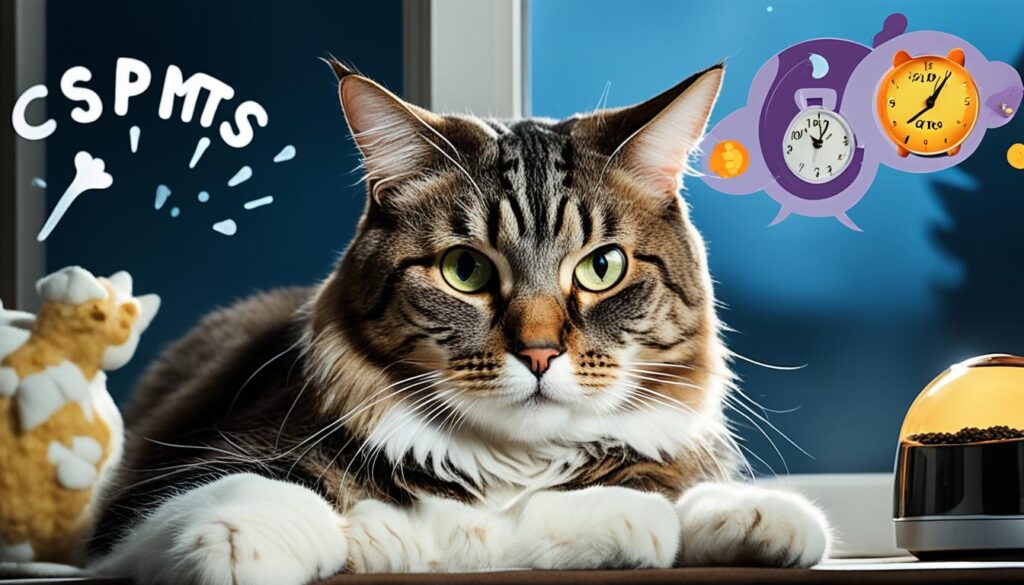
Identifying the Root Cause of Nighttime Meowing
If your cat is meowing excessively at night, it’s important to figure out why they are exhibiting this behavior. By observing their behavior and paying attention to certain signs, you can begin to pinpoint the underlying cause and address it effectively.
Here are some tips to help you identify the root cause of your cat’s nighttime meowing:
- Observe their behavior during the day: Pay attention to any changes in your cat’s behavior during daylight hours. This may provide clues as to what might be triggering their nighttime vocalization.
- Rule out any physical issues: **Physically wrong with your cat** Before assuming it’s a behavioral or emotional issue, it’s important to ensure that your cat isn’t experiencing any physical discomfort. If you’re unsure, consult with a veterinarian to rule out any underlying medical conditions.
- Consider environmental factors: Assess your cat’s surroundings and determine if there are any changes or stressors in their environment that could be causing them distress or anxiety.
- Look for patterns: Keep a log of your cat’s meowing episodes, noting the time, duration, and any potential triggers. This can help you identify patterns and potential causes.
- Consult with a professional: If you’re unable to determine the root cause on your own, consider seeking the guidance of a professional behaviorist or veterinarian who specializes in feline behavior.
Cats are communicative creatures
Remember, cats have various ways of communicating, and meowing is one of them. Your cat may be trying to tell you something, so it’s essential to pay attention and try to understand what they’re trying to communicate.
“Communication is the key to any successful relationship, including the one you have with your cat.” – Jackson Galaxy
By taking these steps and gaining a better understanding of your cat’s behaviors and needs, you can effectively figure out why your cat might be meowing at night. This knowledge will enable you to address the root cause and work towards a solution that will bring peace and restful nights for both you and your feline companion.
Strategies to Stop Cat Meowing at Night
Once you understand the reason behind your cat’s nighttime meowing, there are several strategies you can implement to manage and reduce their vocalization during bedtime hours. These strategies aim to create a peaceful and quiet sleep environment for both you and your cat.
1. Establish a Consistent Bedtime Routine
A well-defined nighttime routine can help signal to your cat that it’s time to sleep. Set a regular bedtime and follow a consistent sequence of activities leading up to that time. This can include playtime, feeding, grooming, and providing a comfortable sleeping space. By creating a predictable routine, your cat will become accustomed to the routine and associate it with winding down for the night.
2. Ensure Adequate Physical and Mental Stimulation
Cats are naturally active creatures, and a lack of physical and mental stimulation during the day can result in nighttime restlessness and meowing. Engage your cat in interactive play sessions and provide toys that encourage active play. Additionally, consider puzzle toys or food-dispensing toys to mentally challenge your cat and keep them occupied during the day. A tired and mentally stimulated cat is more likely to sleep through the night.
3. Create a Calm Sleeping Environment
Make sure your cat’s sleeping area is calm, quiet, and comfortable. Provide a cozy bed or blanket that they can associate with sleep. Minimize any loud noises or distractions in the area, such as TV or radio volume. Consider using white noise or soothing background music to drown out external sounds that might trigger your cat’s meowing.
4. Encourage Independent Nighttime Activities
Many cats are naturally more active during dawn and dusk. If your cat tends to become restless at night, provide them with toys, scratching posts, and safe climbing structures to engage in independent activities. This allows them to burn off excess energy and occupy themselves without disturbing your sleep.
5. Avoid Reinforcing the Behavior
While it can be tempting to respond to your cat’s meowing during the night, it’s important not to reinforce the behavior. Avoid giving in to their demands, such as feeding or playing, as this can establish a pattern of attention-seeking behavior. Instead, wait until your cat is quiet before providing any form of attention or reward.
To further aid you in your efforts to stop your cat from meowing at night, consult with a veterinarian. They can provide additional guidance and rule out any underlying medical conditions that may be contributing to the behavior. Remember, consistency and patience are key when implementing these strategies, and over time, your cat should adjust to a quieter and more peaceful night of sleep.
Seeking Veterinary Assistance
If your cat’s nighttime meowing persists throughout the night or becomes excessive, it may be necessary to seek veterinary assistance. While occasional meowing is common for cats, especially during their heat cycle or when seeking attention, persistent and excessive meowing could indicate underlying issues that require professional attention.
There are 6 common reasons why you might be hearing a cat meowing at night: medical conditions, behavioral issues, hunger, psychological/emotional factors, cognitive changes in older cats, and a disrupted routine. If you’ve ruled out the other potential causes and your cat’s meowing continues unabated, consulting with a veterinarian is a wise step to take.
A veterinary professional will be able to assess your cat’s health and behavior comprehensively to identify any underlying medical conditions that could be causing the excessive nighttime meowing. They will also recommend appropriate tests or treatments, which might include bloodwork, hormonal evaluations, or behavioral evaluations.
The veterinarian can provide guidance on how to address the issue based on their diagnosis. They may recommend specific medications, changes to the cat’s environment or routine, behavioral modification techniques, or other interventions to address the root cause of the meowing. Their expertise will help determine the best course of action to bring you and your furry friend relief.
Remember, your cat’s well-being and comfort are essential. Don’t hesitate to seek veterinary assistance if you’re concerned about your cat’s nighttime meowing. It’s always better to address any potential health or behavioral issues sooner rather than later to ensure your cat’s overall health and to restore peace to your home.
| Symptoms or Situations | When to Seek Veterinary Assistance |
|---|---|
| Excessive meowing throughout the night | If the meowing persists for an extended period or continues to increase in intensity |
| Visible signs of distress or pain | If your cat appears to be in distress, experiences difficulty breathing, or exhibits signs of discomfort |
| Change in appetite or weight | If your cat’s eating habits have changed significantly or if there is unexplained weight loss or gain |
| Abnormal behavior or aggression | If your cat displays sudden aggressive behavior, becomes unusually withdrawn, or exhibits other abnormal behaviors |
| Other concerning symptoms | If you notice any other concerning symptoms or behaviors that don’t align with your cat’s regular patterns |
Creating a Nighttime Routine for Your Cat
It is not uncommon for cats to be active at night and for owners to be disturbed by their meowing. However, by establishing a consistent nighttime routine for your cat, you can help minimize their desire to meow and engage in nocturnal activities.
Here are some tips to create a calming and consistent routine for your cat:
- Set a regular bedtime: Cats thrive on routine, so try to establish a consistent bedtime for your feline friend. This will help regulate their internal clock and reduce nighttime meowing.
- Create a peaceful environment: Make sure your cat’s sleeping area is comfortable, quiet, and free from any distractions that may stimulate their night-time activity. Consider providing a cozy bed or blanket and ensuring the room is dimly lit.
- Engage in interactive play: Before bedtime, engage your cat in interactive play to help tire them out physically and mentally. Use toys that mimic prey-like movements to satisfy their hunting instincts.
- Establish a feeding schedule: Feed your cat their last meal of the day at least a couple of hours before bedtime to prevent hunger-related meowing during the night. Make sure they have access to fresh water at all times.
TIP: Avoid feeding your cat immediately before bedtime as it may increase their energy levels and make them more active during the night.
In addition to these tips, consider providing your cat with a soothing and familiar scent, such as a worn t-shirt or a bed that smells like you. This can help ease their anxiety and provide a sense of comfort.
Also Read:- Tail-Wagging Taste: Unveiling The Top Dog Foods For Growing Puppies
By creating a consistent nighttime routine for your cat, you can help them transition into a more restful sleep, reducing their desire to meow and engage in nighttime activities. Remember, patience and consistency are key when establishing any new routine.
Conclusion
Understanding why your cat meows at night is crucial for both you and your feline companion. By identifying the root cause of their nighttime vocalization and implementing appropriate strategies, you can help your cat achieve a quieter and more restful night’s sleep.
Remember, there are various reasons why cats meow at night, such as medical conditions, hunger, thirst, or psychological factors. It’s important to observe your cat’s behavior and consult with a veterinarian if necessary.
Creating a nighttime routine, addressing their basic needs, and providing a calm environment can also help reduce their meowing. Don’t let your cat’s nighttime vocalization go unaddressed. Take the necessary steps to ensure a peaceful night for both you and your beloved feline friend.
FAQs
Q: Why is my cat meowing at night?
A: Cats may meow at night for various reasons such as seeking attention, experiencing anxiety, feeling disoriented, or even due to medical issues. Understanding the underlying cause is key to addressing this behavior.
Q: What are some common reasons for cats to meow at night?
A: Some common reasons for night-time meowing in cats include hunger, loneliness, the need for playtime, or simply wanting to be let outside. Identifying the specific trigger can help in finding a suitable solution.
Q: How can I stop my cat from meowing at night?
A: To stop your cat from meowing at night, ensure they have a comfortable sleeping area, establish a consistent bedtime routine, provide enough mental and physical stimulation during the day, and rule out any potential health issues with a vet visit.
Q: Is it normal for cats to meow at night?
A: While occasional meowing at night is common in cats, excessive or persistent night-time vocalization may indicate an underlying problem that needs to be addressed. Monitoring your cat’s behavior and seeking professional advice can help determine the cause.
Q: Should I ignore my cat’s night-time meowing?
A: Ignoring your cat’s night-time meowing may sometimes be necessary to discourage attention-seeking behavior. However, it’s important to ensure that your cat’s needs are met during the day and address any potential cats become reasons for their night-time vocalization.
Q: Can changes in my cat’s environment cause night-time meowing?
A: Yes, changes in your cat’s environment such as a new home, rearranged furniture, or the presence of a new pet can lead to stress and increased meowing at night. Gradually introducing changes and providing extra cry at night yowl cat owner night meowing comfort can help your cat adjust.
Q: When should I seek professional help for my cat’s night-time meowing?
A: If your cat’s night-time meowing becomes excessive, is accompanied by other concerning symptoms, or persists despite trying various strategies, it’s advisable to consult a veterinarian or a feline behavior specialist for a thorough evaluation and tailored advice.
Conclusion
Understanding why your cat meows at night is crucial for both your and your cat’s well-being. By addressing the root cause and implementing appropriate strategies, you can help your cat achieve a quieter, more restful night’s sleep.
